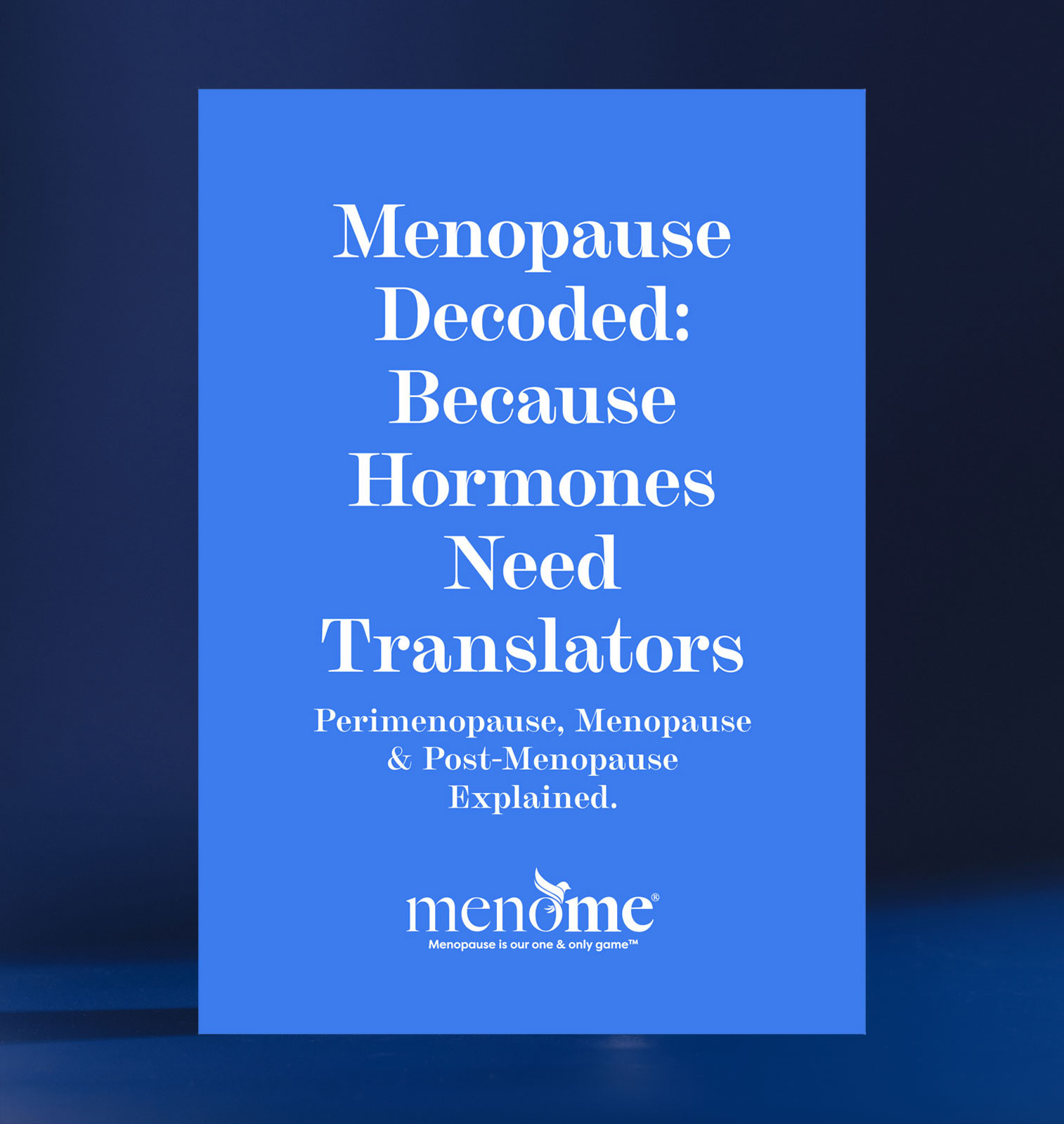Menopause Decoded:
Because Hormones Need Translators
Perimenopause, Menopause & Post-Menopause Explained.
$10.00
About the eBook
You’ve heard of it, you even think you might be close to it, but what exactly is menopause?
Let us take you by our modern hand and give you back your power as we guide you through exactly what you need to know in this beautifully crafted 43-page book.
Menopause is a universal female experience and refers to the time when a woman’s reproductive years come to an end. It’s estimated that 25 million women globally go through it each year.
Menopause begins with perimenopause and culminates when ladies enter a new stage in their lives as their periods end known as post-menopause. This is why it’s often called ‘the change’ or the ‘change of life’.
In popular culture, the subject of menopause is still relatively taboo so women can find themselves completely blindsided by the arrival of perimenopause. Until it rears its head they may have only held – perhaps – a vague awareness to expect a few hot flushes in the distant future.
But there are 34 recognised symptoms of perimenopause we should be aware of as we move into our 40s.
In this eBook we guide you through exactly what you need to know.
Available in electronic versions.
eBook Contents
- What is menopause?
- Menopause: What’s brewing inside you?
- What happens when the hormone orchestra goes off key?
- The stages of menopause
- How many years are we talking?
- Anticipating the unpredictable
- Menopause emotions 101
- Symptoms of perimenopausal depression
- Physical changes ahead
- Mastering the mental maze of menopause
- Find relief and thrive through the change
- Foods containing phytoestrogens
- Menopause & exercise
- Supplementing your way through menopause
- The signs & symptoms of menopause
- Menopause SOS
- The menopause numbers
- Know the 34 symptoms of menopause
- Physical symptoms of menopause
- Psychological symptoms of menopause
- Mastering menopause
- When to see a doctor
- You don’t have to go it alone
- Seven wellness pillars
- The Gut Factor
- How can you improve your gut?
- Five things to avoid
- What about HRT?
- TheMenoMe® ingredient stable
- Menopause frequently asked questions
- References
What Our Customers Say...
carousel title
from 187 reviewsYou'd think that not a lot can happen in 10 days, but it really can! Following along the Shake it Off Hormone Reset with Jenna and the group was a fantastic experience. It was just the kick in the pants I needed to get myself committed to eating better for my body. I've started many Monday's saying I'd do better, but always found reasons not to! Having a group to be accountable to was perfect. In my ten days I noticed my bloated feelings disappear, my digestive system become regular, pain in my joints and feet ease, my rosacea less red and irritated, and a lighter, happier mood. Once my ten days were up, I felt good to continue on with the best practices I had learned and inspired to keep up more adventurous eating to make those veggies and good-for-you foods taste so yummy!
I am taking both the Merry Peri and the Happy Go Tummy. Early days for me but so far I feel like my pre peri younger self is coming back!
Great people behind this company also, can’t fault! Well done
Taking the merry peri capsules has literally changed my life.
My experience of peri menopause has been extreme tiredness, brain fog, increased headaches and migraines, feeling agitated, overly frustrated and sometimes quite angry and not knowing why. These herbs have helped all these symptoms and given me a feeling of overall calm and balance. It has helped me regulate my energy, feel more energised, focused, and I don’t have those feelings of anger and frustration like I did. They have really helped the frequency and intensity of my headaches and migraines, which is a life saver as I was spending a lot of time in pain. I am happier, and I have better relationships with those close to me like my partner and son. Thank you so much to the women at meno-me, I am so glad I found you. At this stage of my hormone shifts, I can not live without these wonderful herbal capsules.
Sometimes going through menopause can be a lonely and confusing time for women. Having the guidance and insights from a coach like Jenna can make a big difference. She was a great listener, empathetic and knowledgable. I highly recommend booking a session. Thanks Jenna!
Have been using for a month now and things seem to be going well so far! Less night sweats and hot flushes, so that's been great!
Lotsalocks is in my permanent stack, that and getting my iron and B vitamins up has stopped my hair loss
Merry Peri I’ve tried it, tested going without it and really uncomfortable symptoms back in force, definitely works for me and so so good, it has been a life stabiliser and rejuvenator, no more symptoms. Going to try Happy go tummy too
I have been so grateful for the customer service and support AND Lotsa Locks has definitely helped my hair. Thank you.
So very Happy with perky post, My sleep has improved and the aches and pains have reduced too, also have so much more energy now .I have recommended it to my friends too. Thank you so much .😍
Have been pleasantly surprised how effective the Lotsalocks has been! I had thinning hair for such a long time and felt so self conscious about it. After a short amount of time using this product I noticed far less hair loss in shower and actually started to see some baby hairs\/new growth. Amazing! No longer feeling self conscious about my hair, which is noticeably fuller.
Lotsa of hair is a lifesaver. Before the supplement, if i tied a ponytail, it was maybe 2 finger width thick. My hair is much thicker now. If I tied a ponytail now, it's double the volume.
Great products
I purchased my first bottle through your stockist Healthpost to try, 3 weeks in and I feel heaps calmer, have just subscribed 🙂
Love the meri peri but still getting quite bloated. So added happy tummy to this order
Prefer and like to try products from New Zealand. Support NZ owned!
Related products
- Digestion and Hair Product Bundle
Tummy Locks 3 Month Bundle
$224.00Original price was: $224.00.$201.60Current price is: $201.60. — or $168.00 every 3 months Add to cart - Post-Menopause Product Bundle
Post Locks 3 Month Bundle
$254.00Original price was: $254.00.$228.60Current price is: $228.60. — or $190.50 every 3 months Add to cart - Post-Menopause
Perky Post® with affron®
From $59.00 — or subscribe and save 15% Select options This product has multiple variants. The options may be chosen on the product page - Perimenopause
Merry Peri® 6 Month Bundle
$255.00Original price was: $255.00.$229.50Current price is: $229.50. — or $191.25 every 6 months Add to cart - Menopause
Meno-Coaching
From $90.00 Select options This product has multiple variants. The options may be chosen on the product page












